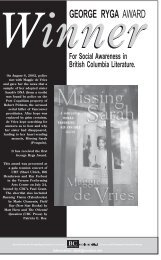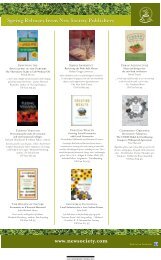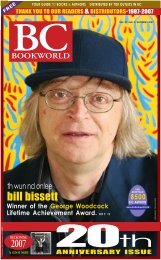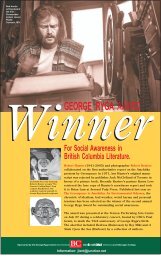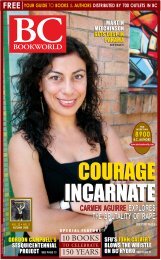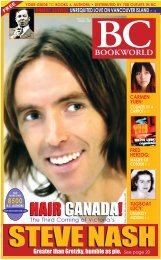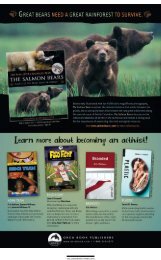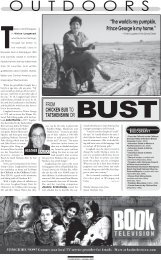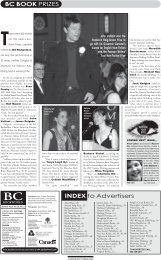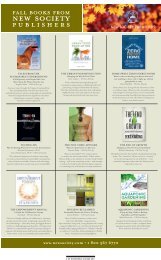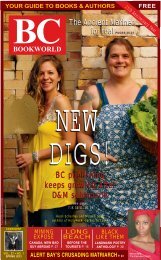BC letters - BC BookWorld
BC letters - BC BookWorld
BC letters - BC BookWorld
Create successful ePaper yourself
Turn your PDF publications into a flip-book with our unique Google optimized e-Paper software.
27 <strong>BC</strong> BOOKWORLD SUMMER 2009<br />
bc book prizes<br />
The President of the West<br />
Coast Book Prize Society, Sally<br />
Harding, declared it was The<br />
Year of the Speech. Here are<br />
two pages of excerpts.<br />
GABOR MATÉ<br />
RECEIVING the Hubert Evans Non-Fiction<br />
Prize for his book about addictions,<br />
In the Realm of the Hungry Ghosts,<br />
Downtown Eastside physician Gabor<br />
Maté reminded the audience of the proximity<br />
to Main & Hastings:<br />
GABOR MATÉ<br />
“Books show us what life is, what it truly is<br />
beneath the surface dross of the mundane and<br />
the day-to-day superficialities of our culture.”<br />
“I’m honoured to have been awarded<br />
this prize for literary non-fiction. It’s a<br />
validation of a deep part of me. Since<br />
childhood books have played an essential<br />
part in my development. Books show<br />
us what life is, what it truly is beneath<br />
the surface dross of the mundane and<br />
the day-to-day superficialities of our culture.<br />
Beyond that, they show us what life<br />
could be like if we honoured who we<br />
really are, and what existence is at its human<br />
and divine core.<br />
“As a writer, I work on two levels. First,<br />
the level of facts and ideas, and in this<br />
realm I don’t have too many self-doubts.<br />
I’m arrogant enough to believe that by<br />
the time my thoughts find their expression<br />
in print, they are grounded in science<br />
and logic and intuition, no matter<br />
how they are received and who agrees<br />
or disagrees with me. But on the level of<br />
literary expression I’m vulnerable. This<br />
is where I have insecurities and for that<br />
very reason this prize is such a welcome<br />
validation, an affirmation that I belong<br />
to the great community of writers.<br />
“Having said that, there is a living<br />
fact I cannot neglect to mention. Ten<br />
blocks to the east of us is the epicenter<br />
of the world I depict in my book, Vancouver’s<br />
Downtown Eastside. Here are<br />
fellow human beings who are ill and impoverished<br />
and hunted and ostracized<br />
because they were abused early in their<br />
lives and, as a result, came to the conclusion<br />
that only through certain substances<br />
will they find relief from their<br />
pain, only through drugs a source of<br />
pleasure, only through addiction any<br />
escape from torments most of us would<br />
find unbearable.<br />
“In the Downtown Eastside thirty<br />
per cent of my patients are of First Nations<br />
origin, whereas our aboriginal people<br />
make up only a small percentage of<br />
the Canadian population. There is a prevailing<br />
myth that they are genetically<br />
prone to addictions to drugs and alcohol.<br />
Nothing is further from the truth.<br />
There were potentially addictive substances<br />
in North America before the European<br />
invasions: peyote, tobacco and<br />
even alcohol. As elsewhere in the world,<br />
aboriginal peoples used<br />
psychoactive substances<br />
as spiritual teachers<br />
and never in an addictive way.<br />
“That the DES is so heavily populated<br />
by people of First Nations background<br />
has nothing to do with genetics, and everything<br />
to do with they way our society<br />
has displaced and oppressed them, drove<br />
them from the lands and natural habitat,<br />
destroyed their ways of life, invalidated<br />
their spiritual universe and, finally,<br />
abused their children for several generations<br />
in the residential school system.<br />
That dislocation and that abuse is the<br />
template for addictions.<br />
“So amidst this celebration of our<br />
culture, of our writers and poets and<br />
publishers and books, we must not forget<br />
the reality of those who, no fault of<br />
their own, lead lives of suffering and<br />
not-so-quiet desperation only a<br />
short distance away, whose entire<br />
lives are a struggle against<br />
despair.”<br />
KATARINA<br />
JOVANOVIC<br />
RECEIVING the<br />
Christie Harris Illustrated<br />
Literature Prize<br />
for The King Has Goat<br />
Ears, Serbian-born<br />
Katarina Jovanovic<br />
repeated the aphorism,<br />
‘Good children’s literature<br />
appeals not only to the child<br />
in the adult, but to the adult<br />
in the child.’ She continued:<br />
“I wanted to make a book<br />
about the necessity of self-acceptance,<br />
but also about its complexity.<br />
Accepting yourself the<br />
way you are is not an easy job and<br />
it requires work and patience.<br />
“The main character in my<br />
book is the king who was born with<br />
goat ears. Of course, he is very much<br />
ashamed of that and his difference<br />
creates lots of difficulties in his life including<br />
the barbers who come one after<br />
another to shave him and do his royal<br />
haircut. When the king finally pokes his<br />
head out of the carriage for the first time<br />
Gabor Maté writes exploratory books about<br />
mental and physical health issues such as<br />
addictions and attention deficit disorder.<br />
and shows himself in public, he shouts,<br />
“It is true, the king does have goat ears!”<br />
“By doing that he is a winner. In children’s<br />
eyes he is a hero just like any other,<br />
for what makes a hero is not his perfection<br />
but his strength and the ability to<br />
act in an exceptional way.<br />
“I felt a huge admiration for this<br />
character, after the book had been published.<br />
Presenting it to the young readers<br />
and answering their questions I<br />
realized that even though I had written<br />
the book and had created the protagonist,<br />
there was a lot for me or any other<br />
adult to learn from it.<br />
“I am a person of words and language<br />
had been my major channel to<br />
life since I was a child. Fifteen years ago,<br />
I lived the words: I was a writer and a<br />
journalist with a solid career in radio<br />
broadcasting. I saw poetry in every segment<br />
of the day. But it was all in another<br />
country and in another language.<br />
“When I came to Canada I spoke<br />
English very well like many people from<br />
Europe who went through university<br />
studies and travelled. My English was<br />
good enough to work, to read, to teach,<br />
to integrate and to make friends. But not<br />
sufficient to be the writer I used to be.<br />
“Language is not only about grammar<br />
and morphology, it is also about the<br />
mind and the feelings. It took me years<br />
of silence, years of seeing myself as a diminished<br />
poet, before I started sensing<br />
the English words the way I had felt the<br />
words in my first language. It took me<br />
years of not writing for the simple reason<br />
that I couldn’t decide in what language<br />
to write.<br />
“It took me years before my deepest<br />
reflections and thoughts touched<br />
the words and I started<br />
writing literature in<br />
English. Still, it<br />
takes courage to<br />
talk about<br />
that.”<br />
BOOKS:<br />
Scattered Minds (Knopf 1999)<br />
When the Body Says No (Knopf 2003)<br />
Hold On To Your Kids (Knopf 2004) with Gordon Neufeld<br />
In the Realm of Hungry Ghosts (Knopf 2008)<br />
LAURA SAWCHUK PHOTO



